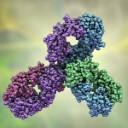-
May 14: The Week in Cancer News
Researchers report disappointing results about ovarian cancer screening, and cancer patients with impaired immune function feel uncertain about protection offered by COVID-19 vaccination.
by Marci A. Landsmann
-
Rethinking Access to Disability Benefits
Advances in screening and treatment mean there are more cancer survivors than ever, but survivors who struggle to work can face difficulty getting disability payments.
by Jen Tota McGivney
-
Expanding Immunotherapy
At a patient advocate event, researchers discussed how to extend the benefits of immunotherapy to more people.
by Kevin McLaughlin
-
May 7: The Week in Cancer News
A Food and Drug Administration panel recommends withdrawing approvals for two treatment indications for immunotherapy drugs, and the U.S. Preventive Services Task Force recommend against vitamin E and beta-carotene for cancer prevention.
by Kevin McLaughlin
-
Should All Kids With Cancer Get Genetic Testing?
Testing children with cancer for hereditary mutations could impact their treatment and provide information relevant to other family members.
by Marcus A. Banks
-
April 30: The Week in Cancer News
President Biden resurfaces a proposal for a new health care agency, and the Food and Drug Administration approves a treatment for large B-cell lymphoma.
by Bradley Jones
-
Understanding How Radiation Causes Cancer
Researchers are investigating who is at greatest risk for radiation-induced cancers.
by Kate Yandell
-
How Long Do Immunotherapy Side Effects Last?
For people with melanoma who receive immune checkpoint inhibitors after surgery, side effects can remain even after treatment has been completed. These chronic side effects are most often mild.
by Anna Goshua
-
April 23: The Week in Cancer News
Anti-racism activist and historian Ibram X. Kendi opens up about his stage IV colon cancer treatment, and the FDA approves an immunotherapy drug for endometrial cancer
by Marci A. Landsmann
-
Making Connections at the AACR Annual Meeting 2021
Attending a scientific conference as a patient advocate can be an exhausting, overwhelming and hugely rewarding experience.
by Bradley Jones
Cancer Talk
Many People Don’t Get Colonoscopy After Receiving Abnormal Blood Tests
About half of people who receive abnormal results from colorectal cancer screening tests don’t follow up with a colonoscopy.
by Laura Gesualdi Gilmore
Can Steroids Impair Immunotherapy for Cancer?A new study suggests steroids could blunt the effects of some immunotherapies, but researchers say they remain necessary for some patients.
by Kyle Bagenstose
Treatment Combination Improves Survival in Platinum-resistant Ovarian CancerPreliminary results found that combining relacorilant with nab-paclitaxel improved outcomes for women with advanced ovarian cancer.
by Sandra Gordon
CAR T-cell Therapy Shows Response in Rare Brain CancerPotential new approach to treating diffuse intrinsic pontine glioma uses engineered immune cells infused directly to the brain.
by Taneia Surles














